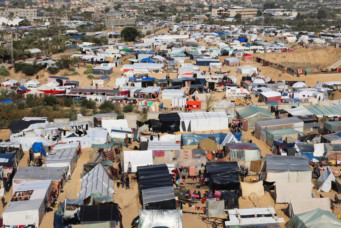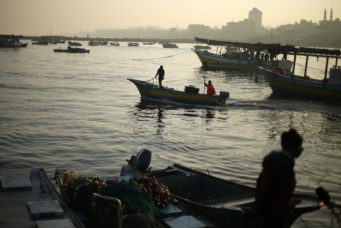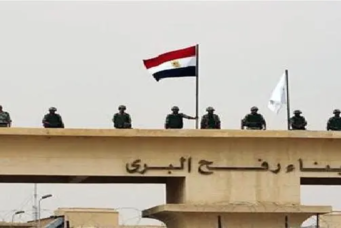Egypt’s Catch-22 in Gaza: Threats and Opportunities
What are Egypt’s top policy challenges should Palestinians in Gaza have no choice but to seek safety in Egypt?

Displaced Palestinians, who fled their houses due to Israeli strikes, shelter in a tent camp near the border with Egypt, amid Israel’s ongoing war on the Gaza Strip. Dec 11, 2023. Mohammed Salem/Reuters
The intense and largely indiscriminate bombing of Gaza has forced more than half of the 2.2 million inhabitants of the 365-square-kilometer enclave mostly to the south, closer to Egypt. They are now struggling for basic needs under unsafe and inhumane conditions, while remaining under the constant threat of Israeli bombardment. Some officials in the Israeli, the U.S. and European governments have pushed Egypt on several occasions, publicly and otherwise, to transfer a large number of Gaza’s inhabitants (some reports even referring to the whole population) onto its land, particularly in the Sinai Peninsula. While Cairo firmly and publicly rejected such a scenario, it could end up contemplating this proposed plan as the war continues to push Gaza’s population toward its border.
The most vexing question facing the Egyptian government at the moment is how to handle persistent pressures (and possible financial incentives) to allow hundreds of thousands of Palestinians as refugees, even if “temporarily.” Israel’s 2023 war on Gaza has imposed this and other challenges on Cairo as it tries to navigate its own security concerns, manage its ties with Tel Aviv and its backers in the West, weigh its economic prerogatives, and take into account a pervasive anger among Egyptians in response to Israel’s brutal campaign that killed many thousands and inflicted massive destruction in the Israeli-besieged Strip.
Furthermore, Egypt has been the main interlocutor between Israel/the international community and the authorities in Gaza since the Hamas movement took control over the Strip in 2007. This strategic role, however, might change after the guns fall silent and before a ceasefire is firmly agreed contingent on the fate of Hamas and whether a massive transfer of population does occur.
Should push come to shove, the factors shaping Egypt’s position include fears over national security and having to contend with the spectre of a “Nakba 2.0” on one hand versus the possibility of receiving economic incentives from countries and organizations should it host the war’s refugees, and a noble badge for its humanitarian assistance and solidarity on the other.
The Egyptian Public Opinion Quotient
Undoubtedly, there is a groundswell of pro-Palestinian sentiment among Egyptians, who are angry at the Israeli killing machine targeting their “brothers and sisters” in Gaza. They are motivated by basic human sympathy and, more importantly, a cultural and historical understanding of the Palestinian-Israeli conflict, which cultivates a sense of empathy and brotherhood with Palestinians. Many Egyptians are already disgruntled with fast deteriorating economic conditions in their own country, however. Adding another source of economic malcontent with a government that is unable to stop the war or mitigate its effects is not an issue that it is ready to contend with.
The regime likely fears a backlash if the situation worsens to where Palestinians approach the Rafah border trying to flee to safety. It will be criticized if it denies those Palestinians the safety of crossing into the Sinai, but if it does, it could be severely chastised for what many would see as playing into the hands of an Israeli geostrategic objective to forcibly displace Palestinians from Gaza. Many commentators see the Israeli plans for a population transfer of Palestinians out of Gaza as a Nakba 2.0, reminiscent of the 1948 ethnic cleansing of mandate Palestine, when the ancestors of nearly 1.7 million Gaza Palestinians registered as refugees by the UN Relief and Work Agency (UNRWA) were pushed out of their villages and towns by armed Zionist militias fighting to establish the state of Israel. Many of them reside in refugee camps throughout the Middle East.
Although public sentiment might not be a decisive factor in shaping the government’s decisions in light of the economic crisis, the Egyptian government might be forced to take the popular reception of its decision into serious consideration. If Cairo accepts to take a large number of Palestinians (even as “guests” as one source close to the government told me), it needs to present an acceptable public narrative, including convincing guarantees that these “guests” will be allowed back into Gaza, unlike the Palestinians who took a similar decision seventy-five years ago and could never return.
Cairo’s Security and Economic Fallouts
Should Egypt welcome Gazans disaffected by the war, security and economic challenges may be more crucial in shaping Egypt’s calculations and decisions.
President Abdelfattah El-Sisi firmly stated that the movement of large numbers of Palestinians from Gaza to Sinai would mean turning Sinai into a “base for launching operations against Israel”. This is a likely outcome that Cairo would clearly like to steer away from, especially as it tries at all costs to avoid becoming a party to the conflict.
Moreover, the Egyptian security agencies are undoubtedly wary of letting in thousands of Palestinians who will inevitably include supporters of the Muslim Brothers’ ideology, since Hamas emerged in 1987 during the first Palestinian uprising, or intifada, as a spin-off of the Muslim Brotherhood’s Palestinian branch. This is a challenge that can be addressed through a careful screening of Palestinians allowed into Egypt, but over-cautious state agencies likely remain concerned about such a move.
In addition to a thorough screening, some diplomatic sources tell me that Egypt’s security concerns could be mitigated by dispersing these “guests” among various provinces away from the Sinai and border areas, provided there are firm commitments from Israel—with guarantees from the United States—that they could return once the war dwindles down.
Still, Egypt clearly prefers to contribute to reducing security tensions through mediation and communicating directly with Hamas to ensure de-escalation, rather than taking a front-line seat in the conflict, or creating domestic security complications for itself. For many years, Egyptian intelligence services have mediated between Israel and Hamas to de-escalate tensions, reach ceasefires, and help exchange prisoners.
In relation to economic challenges, European and American officials have repeatedly emphasized that ongoing talks about providing Egypt with economic aid are unrelated to accepting Palestinians refugees from Gaza. However, there have been reports of multilateral financial support from international organizations or from the European Union and the United States, promised to Egypt to deal with the economic fallout from Gaza in particular, and its economic woes in general.
For a regime that has been largely transactional in its foreign policy, the allure of economic incentives and the continuation of Western political support could be the overriding factor in shaping how it will respond to the plight of the Palestinians in Gaza.
Egypt is facing a severe economic crisis with soaring inflation rates, rising debt, and declining currency. The crisis will continue to worsen not only because of failing domestic policies but also due to the impact of the ongoing global economic slowdown. The Israel–Gaza war will most likely hit Egypt’s income from the tourism industry, one of its main sources of hard currency.
This rather myopic approach to policy making is encouraged by an extremely controlled and shrunk political space. The parliament is but a rubber stamp; there is no serious political opposition; and the mainstream local media is either owned by or almost fully subservient to the state. Thus, a serious discussion about medium to long-term impacts on Egypt if it accepts the suggested plan to host Palestinians forcibly displaced by the war is simply an impossible public conversation to have, leaving the decision to be made in an opaque manner subject to somewhat ambiguous processes. This is probably why the serious political and historical implications of such a move would occupy a far second place, together with possible popular opposition.
Nevertheless, it remains challenging to imagine Egypt accepting refugees whom it knows will probably be unable to return, nor proceed to a third country, which will probably be the case. Because the economic crisis in Egypt is largely structural and exacerbated by the country’s economic policies, the alleged economic incentives on offer may mitigate short-term woes, but would not be adequate in the long term, certainly not enough to justify a decision with immense popular and historical repercussions, along with a security bill that should grow over time.
The painful part of all this is that, just a few hundred kilometers away from the well-guarded rooms where a few people are probably debating such decisions, the suffering of hundreds of thousands of Palestinians continues to escalate. Perhaps the only solution out of this recurrent policy predicament would be for Egypt to continue pushing for a more enduring ceasefire, more relief (and in the medium-term) reconstruction efforts, then try to resuscitate a long-stalled search for a political solution. This seems like a pipe dream and too ambitious for the current regional and global political setup, but the other alternatives are all seriously flawed and could backfire sooner than many people think.
Khaled Mansour is a writer and analyst with thirty years of experience. As a journalist and then a UN spokesperson, he worked for years in conflict and transitional situations in South Africa, Afghanistan, Iraq, Lebanon, and the Sudan in addition to his in Washington DC in the 1990s. Before he became a full-time writer in 2015, he was the Executive Director of Egypt’s leading human rights organization, EIPR (2013-2014). He published seven books, mostly in Arabic. His debut novel, “A Minefield” and his memoirs on Afghanistan, “From Taliban to Taliban” appeared in early 2022, while “From Fear to Freedom”, was published in early 2023. He keeps a blog at khaledmansour.org
Read More




